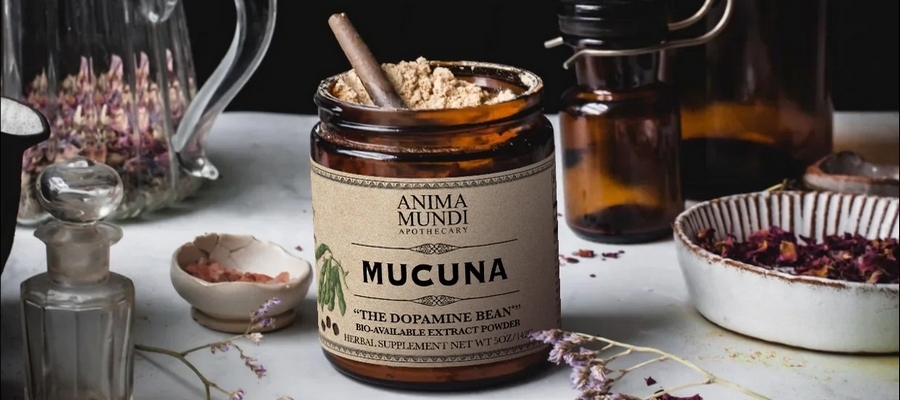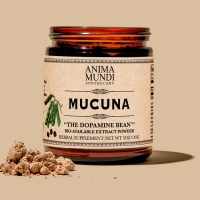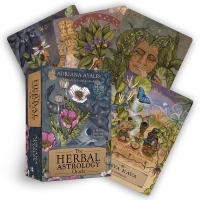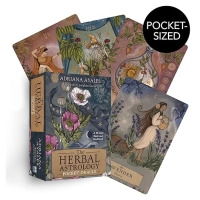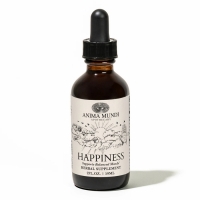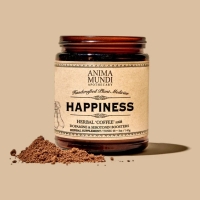What Mucuna can bring to your 'journey'?
Who is Mucuna?
"I am Mucuna, the velvet dopamine bean, and I guide your 'journey' by connecting you with your 'higher mind'. I help you trust the higher states of your consciousness, making the transition you're in easier. This allows you to better leave the old behind and move towards the unknown and the new." This transmission of knowledge comes from The Herbal Astrology Oracle, a beautifully illustrated card deck, developed by the creator and owner of Anima Mundi products.

Mucuna stimulates the neurotransmitters known as the molecules of higher consciousness, as I read in the guide that comes with the cards. It activates the pineal gland, or the third eye. According to the booklet, it's a plant that helps expand our consciousness. The blue-purple color of the flowers where the beans grow refers to this property; it corresponds to the colors of the 6th and 7th chakra.
Not only in the spiritual realm but also on a physical, mental, and emotional level, mucuna has much to offer us. To discover more about this, we travel through different healing traditions.
Mucuna in Ayurveda
In Indian Ayurveda, which means science of life, mucuna is called 'kapikacchu' and has been used for thousands of years for a whole range of ailments. In India, it's seen as an aphrodisiac, among other things.
Mucuna in Traditional Chinese Medicine
In the herbal tradition of Traditional Chinese Medicine (TCM), mucuna falls under the remedies that stimulate yin. Vitality is seen as the essence of mucuna. It has powerful potential for the brain, nervous system, and hormonal system. Within the philosophy of TCM, our inner yin side (the receptive, calming aspect of ourselves) decreases as we age or experience a lot of stress. Mucuna can restore this imbalance between yin and yang.
Mucuna in Western naturopathic traditions
In the West, we know mucuna by its full Latin name mucuna pruriens. The beauty of the Western, more scientifically oriented approach is that research is done on the active ingredients of herbal medicinal substances. This supports the indications for use from Eastern, ancient traditions with facts. This is also the case with mucuna.
Although mucuna consists of a wide range of ingredients, we highlight one, namely levodopa, a precursor of the neurotransmitter and hormone dopamine. Dopamine is involved in many processes in the body: motor skills, mood, sexuality, sleep, cognitive ability, behavior, and motivation. Ingesting levodopa leads to your brain producing more dopamine and stimulates the pituitary gland to release growth hormone and increase testosterone levels.
The dopamine bean
The pharmaceutical industry extracts levodopa from the beans of mucuna pruriens, among other sources, to make medication for Parkinson's disease. From a holistic point of view, however, the medicinal effect of plants (parts) is based on the cooperation of all ingredients, where 1 plus 1 is usually 3. It's the alchemy of the plant kingdom. Research has been done in which mucuna pruriens is administered to subjects with Parkinson's disease. Those who want to know more about this can read up on the relevant scientific literature (1,2,3).
Various studies show that intake of mucuna pruriens increases dopamine levels, but also testosterone (the male sex hormone), adrenaline, and noradrenaline (two stimulating neurotransmitters/hormones). The stress hormone cortisol, on the other hand, decreases.
Unfortunately, we too have to adhere to the rules of European legislation, which means we can't communicate everything about mucuna. What we can mention is that mucuna has a positive influence on the nervous system, is good for the urinary tract, keeps your appearance fresh and youthful, helps protect against aging, and is therefore very nice to use if you experience reduced vitality.
The amount of levodopa (l-dopa) in Anima Mundi's Mucuna is standardized to 15%, which guarantees a consistent amount of this active ingredient. This amount is equal to the better mucuna pruriens supplements available in the Netherlands, generally in capsule form. Anima Mundi distinguishes itself by offering it in powder form, and fortunately so, because this velvety powder with a mild nutty and slightly roasted taste feels like an enrichment of my daily coffee moment.
My experience
When I came into contact with the Herbal Astrology Oracle and drew the Mucuna card, I was immediately struck by the message, which perfectly fits the process I'm in and is aptly called 'Journey'. I immediately knew I wanted to take mucuna to experience its power firsthand. The Mucuna from Anima Mundi comes in a nice brown glass jar with a stylish label. The powder is camel-colored. It's interesting to discover that in South America, mucuna has been drunk as an alternative to coffee for hundreds of years, where it's called 'nescafe'.
I've been drinking it once or twice a day in my coffee for a few weeks now, and sometimes I put a little in my tea. The first day was the most striking. Both my boyfriend and I experienced a very pleasant, relaxed focus; a state in which we could get a lot of work done without it costing much energy. My night's sleep has been very good for weeks, which can fluctuate quite a bit for me, but not now. I also find the speed with which I can return to relaxation when I'm a bit stressed or disturbed remarkable and very nice.
Although I have to admit honestly that on the 'journey' I'm making, I often can't distinguish which effect I have from what. But that doesn't matter, living holistically also means letting go of what exactly caused the development you're going through. Everything interacts. You can trust that if you follow your intuitions, you receive and give exactly what is needed for the whole.
Do you feel that Mucuna has something beautiful to offer you too? I would say follow your intuition...
Sources:
1) Pulikkalpura H., Kurup R, Mathew PJ & Baby S. Levedopa in Mucuma pruriens and its degradation. Sci Rep. 9 juni 2015; 5(1): 11078.
2) Cassani E, Cilia R, Laguna J, Barichella M, Contin M, Cereda E et al. Mucuna pruriens for Parkinson's disease: Low-cost preparation method, laboratory measures and pharmacokinetics profile. J Neurol Sci. 15 juni 2016; 365-: 175-180.
3) Cilia R, Laguna J, Cassani E, Cereda E, Pozzi NG, Isaias IU et al. Mucuna pruriens in Parkinson's disease: A double-blind, randomized, controlled, crossover study. Neurologie, 1 augustus 2017; 89(5): 432-438.
This article was written by Terah Afke Beek. Visit her website for more inspiring content: terah-pi.nl.


